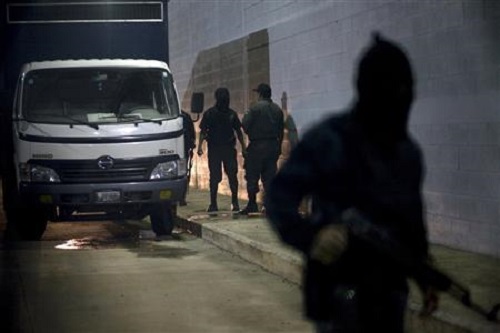Reuters photo
By
Ricardo Swire
Caught in a crossfire between the world’s largest cocaine suppliers and consumers, Central American and Caribbean territories have suffered the consequences of the international drug trade. Crime and violence are strongly associated with specific social and economic weaknesses. Patterns identify Central American countries among the world’s most unequal in terms of income. Secondary school enrolment rates average below fifty percent, an area targeted by drug gangs and criminal organization recruiters.
The Miami, Florida interception of Guatemalan drug baron “Che Manuel” was a formidable achievement for law enforcers battling such Central American underworld organizations. Intelligence data recounts circumstances surrounding the first attempt by fifty Guatemalan National Police officers, K-9 units, a Section of soldiers and four helicopters to capture the Kingpin. The eight hour operation, assisted by a special American Drug Enforcement Administration (DEA) helicopter, missed the shadowy Guatemalan trafficker who escaped to Honduras.
Taskforce officers interviewed the fugitive’s wife and bodyguards. Three years later a top-secret mission successfully arrested Che Manuel. The American/Guatemalan/Honduran Unit detained him for possession of cocaine in Chiquimula, Guatemala received from the Valle Cartel in Honduras. Millions of dollars in cash and high-calibre firearms were repatriated to Honduras in return. After his extradition to the US, Southern District of Florida court documents listed Che Manuel’s detention date as August 17, 2017, registered in the state of Virginia. His place of arrest was an “unidentified country.“
Caribbean internal security intelligence officials classified the Guatemalan as a major drug trafficker in the department of Chiquimula, one of Guatemala’s main cocaine smuggling conduits. He is named in the 21 page US affidavit as middleman for Honduras’ notorious “Valle brothers.” In 2014 counter-narcotics law enforcers detained the two Valle Cartel leaders. America’s DEA credits them with multi-ton cocaine consignments entering America. Patterns showed how the 42 and 45 year old Valle brothers influenced senior Honduran public officials while overseeing kidnapping, extortion and murder syndicates.
Valle Cartel headquarters functioned from northwest Honduras, close to Guatemala’s border. It acted as logistics centre for Colombian cocaine destined for Honduras and American states Arizona, Illinois, Texas and Virginia. US federal authorities intercepted one Valle Cartel cocaine shipment transported by courier aboard a flight from Honduras to Dulles International Airport in Virginia. Che Manuel masqueraded as the successful owner of a construction company and gas stations in San Juan Ermita municipality, Chiquimula department of Guatemala.
He was insulated from local law enforcement by a political force-field generated by his uncle the Mayor of San Juan Ermita municipality. Che Manuel was the son of a Councillor of San Jose Arada, another town in the same district. Under Guatemala’s former government his uncle the Mayor was made Governor of Chiquimula. The drug baron’s protection was reinforced by the Mayor of Concepcion Las Minas community that adjoins El Salvador. One Central American intelligence specialist, a Guatemalan Army Lieutenant-Colonel, profiled Che Manuel as a powerful drug trafficking shadow who operated invisibly for thirteen years in both Guatemala and Honduras.
The Central American drug lord stealthily dominated Copan in Honduras and Zacapa in Chiquimula Guatemala. He owned buses that travelled from Olopa and Quetzaltepeque on the border with Honduras to Chiquimula in Guatemala. Che Manuel’s alliance with Mexican trafficker “La Tena” facilitated his drugs and cash deliveries on the Mexican border. As evidence Guatemalan justice officials possess digital recordings of telephone calls, plus pictures of La Tena and Che Manuel attending planning meetings to ship Colombian cocaine consignments.
Ricardo Swire
Ricardo Swire is the Principal Consultant at R-L-H Security Consultants & Business Support Services and writes on a number of important issues.



No Comments Yet!
You can be first to comment this post!